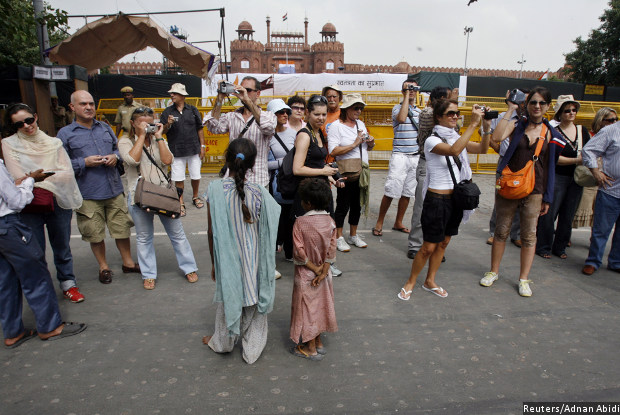84% Rise In Foreigners Entering Illegally Or Overstaying
Foreign tourists take pictures outside the historic Red Fort in the old quarters of Delhi. As many as 1,367 foreigners were arrested in 2015 under the Foreigners Act, 1946, which is meant to prevent illegal entry and stay in India.
The number of foreigners overstaying or illegally entering India rose 84% in 2015 over the previous year, according to data released by National Crime Records Bureau (NCRB).
Ten times as many foreigners were also arrested for this breach of the 70-year-old Foreigners Act--the most-reported crime--than for possession of illegal narcotics and substances, the NCRB reported.
As many as 1,367 foreigners were arrested in 2015 under the Foreigners Act, 1946, which is meant to prevent illegal entry and stay in India.
The second largest number of arrests (143 people) in 2015 was for using fake passports and other crimes that fall under the Passport Act, 1967, a 16% increase since 2014.
The next largest number of arrests (128 people) was of foreigners found with illegal narcotics or substances, a 14% increase over 2014.
As many as 2,057 foreigners were arrested and 872 convicted in 2015 as against 1,843 arrested and 638 convicted in 2014, an increase of 11.6% and 37% respectively. Of these, 66% arrests and 72% convictions were for crimes committed under The Foreigners Act, 1946.
Source: National Crime Records Bureau
The Foreigners Act states that foreigners must enter and exit India where and when they are told. The Act is meant to prevent illegal entry and stay in India by ensuring that what foreigners do in India can be monitored and controlled.
Foreigners are also not allowed to operate under any alternate name during their stay in India, and hotel owners have to keep copies of the visas and passports of foreign guests. Penalties under the Act are a prison sentence of up to five years and a fine.
As many as five Bangladeshis were arrested under the Foreigners Act for staying in Thane, a Mumbai suburb, without valid passports, the Times of India reported in March 2016. They were jailed for two years and fined Rs 2,000.
Victims of human trafficking are usually charged under the Foreigners Act, The Hindu reported in September 2016. Cases of human trafficking have increased 60% over four years to 2014, IndiaSpend reported in August 2016.
A woman from Uzbekistan was arrested in May 2016 under the Act for not having a valid visa, but she claimed to have been abducted and brought to India.
As many as 2,631 foreigners were awaiting trial for crimes committed under the Foreigners Act at the end of 2015, more than for any other crime.
As many as 627 foreigners were convicted for crimes under the Foreigners Act in 2015, a 120% increase over 2014. The conviction rate was 92%, and 684 trials were completed with 56 foreigners acquitted.
Further, 126 convictions--the second largest number--were under the Registration of Foreigners Act. Only 10% trials were completed for this crime, and 1,689 foreigners were on bail or in custody at the end of 2015.
The next largest number of convictions was for fake passports: 63 people were convicted, a conviction rate of 71%; only 89 trials were completed, leaving 2,407 pending at the end of 2015.
The conviction rate was 44% for drug crimes: while 24 foreigners were acquitted of drug crimes, 20 were convicted.
There were 26 foreigners to be tried for rape in 2015, 17 of them running over from 2014 in which only one trial was completed and the result was an acquittal. None of the rape trials were completed in 2015.
Three foreigners were convicted of murder in 2015, and there were 15 pending trials at the end of the year.
(Moloney is a multimedia journalist and has a BA (Hons) degree from the University of Birmingham, UK.)
We welcome feedback. Please write to respond@indiaspend.org. We reserve the right to edit responses for language and grammar.
__________________________________________________________________
“Liked this story? Indiaspend.org is a non-profit, and we depend on readers like you to drive our public-interest journalism efforts. Donate Rs 500; Rs 1,000, Rs 2,000.”



